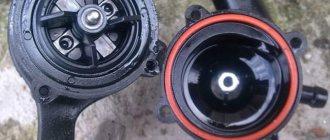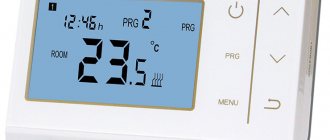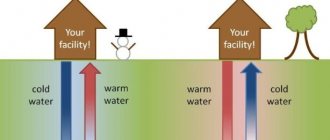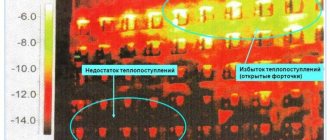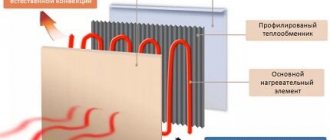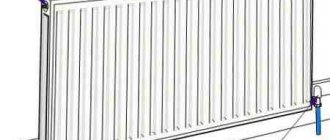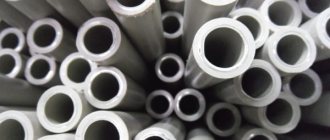Thermostat (temperature regulator) is a device that allows you to maintain the temperature according to the set values. The main part of the thermostat is the temperature sensor installed in the room. It constantly measures the temperature and when the temperature value increases or decreases, it sends a command to the heating boiler, which in turn adjusts the operating mode.
Temperature control is carried out by comparing external indicators with indicators specified by the user. To avoid exceeding the desired values, the thermostat must be installed away from radiators and other heating devices - constant heating will “confuse” the temperature sensor.
Types of thermostats
Thermostats can be classified according to several parameters. According to the method of data transmission, they are divided into:
- Electromechanical . The operation of a mechanical thermostat is carried out by a bimetallic plate and dry contacts. This is the simplest type of device with the lowest price.
- Electronic . Temperature control is carried out using a sensitive electronic sensor that minimizes errors.
The type of signal transmission differs:
- Wired . The signal is transmitted through wires. This system is gradually becoming a thing of the past, because not everyone wants to do additional wiring.
- Wireless . The most popular type of equipment. Data transmission is carried out using a radio signal, which avoids laying additional wires during installation. The wireless type also includes thermostats with remote control provided by a built-in GSM module.
It is worth noting the differences in the number of functions:
- Single-function . Devices that have only one function - maintaining temperature according to specified parameters. The simplest type of thermostat.
- Multifunctional . Such devices not only control the temperature, but also allow you to adjust parameters depending on the time of day, “know how” to work with heated floors, etc. (see list of functions below).
Device selection
The thermostat you choose must meet your needs and be technically suitable:
- If it is not possible to install conductors from the thermostat to the boiler, then a wireless model is suitable for you.
- If you want to optimize the operation of your heating system as much as possible, you should take a closer look at programmers and non-volatile boilers.
Thermostat-programmers usually have 2-3 weekly modes, and 3-4 daily ones. This will ensure that the apartment is heated to the required temperature while you are at home, and the system will automatically switch to economy mode while you are away.
Most models have inertia. That is, the heating system is turned on in order to warm up the room before your arrival.
READ ALSO: All about GSM modules for heating boilers: controller functions, popular models, operation
A good option would be to choose a device from the same manufacturer as your gas boiler. This will avoid installation difficulties (gas boiler connection diagram).
Advantages and disadvantages of devices
The advantages are obvious:
- Reducing energy and fuel consumption. By preventing overheating or underheating, fuel and electricity savings will be about 10-15% per year.
- Additional protection against overheating and system malfunctions.
- Fully automated temperature control process. It is enough to set the desired indicators once - subsequently the system will do everything independently.
- When using GSM thermostats, it is possible to control them remotely.
- Electronic thermostats have a small error, due to which they provide the most comfortable temperature.
- Increasing the service life of the heating boiler. Temperature changes occur in a gentle manner, which reduces equipment wear, increasing its service life.
There are few disadvantages to using such equipment:
- Price . Electronic programmable devices have a fairly high price - depending on the boiler model and the “functional” set, the price of a thermostat can reach up to 12,000 rubles.
- Versatility . The temperature sensor monitors the temperature of the entire room in which it is installed. It will not be possible to select individual zones with different temperatures - control will always be carried out based on the average value.
- Installation . Each type of equipment has its own installation characteristics; there is no universal “recipe” for installation.
Three main advantages of thermostats
Automation for a gas boiler
The air in the room does not cool down as quickly as the coolant in the circuit, so the number of starts of the heating unit is reduced many times over, which has a beneficial effect on its service life and your financial condition.
As stated above:
- they increase the level of comfort - the room temperature will be stable in any weather, only the frequency of switching on the heating system will change;
- eliminate the need for frequent adjustment of boiler parameters;
- significantly reduce heating costs.
In normal mode, the boiler fires on average once every 10 minutes and heats the water for 1-2 minutes, while the pump operates constantly. If there is automation, the boiler will turn on much less frequently, and the pump will work only when necessary, pumping the heated coolant through the circuit.
READ ALSO: Hydraulic accumulators are guardians of the water supply system
According to some reports, savings can be up to 25-30% , which makes the device very effective and quickly pays for itself.
Modes and functions of a temperature controller for a heating boiler
Most “advanced” models have two main modes: “day” and “night”. These modes allow you to set the optimal temperature for each time of day and not worry about the boiler heating an empty room during the daytime.
Basic inexpensive models have rather limited functionality, while more expensive devices will delight you with a wide range of additional functions:
- Working with a heated floor system.
- Control of the hot water supply circuit.
- Time and date display.
- Additional illumination in night mode.
- Possibility of control using remote access.
- Lowest possible error in temperature control.
- Ability to schedule temperature levels several days in advance.
TOP 5 most popular models on the market
Zilon ZA1 - the flagship in the line of mechanical options
The simplest mechanical model, designed for equipment that supports the connection of “mechanics”. Relatively small temperature range ( from +10 to +30 ). Not recommended for use in rooms with high humidity.
| Sensing element | bellows (filled with gas) |
| Operation temperature, C | 10…30 |
| Ambient temperature, C | 5…30 |
| Protection class | II |
| Degree of protection | IP 20 |
| Resource (number of cycles) | 10 000 |
| Execution | wall-mounted |
| Dimensions, mm | 80 x 80 x 40 |
| Color | white |
| Relay output | 16 (4) A / 250 V~ |
| Differential | t=0.4/0.8 K |
| Rate of temperature change | 1 K/15 min |
| Working conditions | normal environment; not installed in rooms with high humidity and in aggressive environments |
| Peculiarities | built-in on/off switch, indicator |
Protherm Exacontrol - a budget device with temperature programming capabilities
It can work both with the equipment of the manufacturer and with boilers of other types. It regulates the temperature only in the heating circuit, the range is from +5 to +35. Equipped with a light display.
| Dimensions (height x depth x width) | 95 mm x 40 mm x 130 mm |
| Connection | Wired |
| eBus control interface | – |
| Regulation | |
| Adjustable temperature range (heating), °C | 5–30 |
| Adjustable temperature range (water supply), °C | 38–65 |
| Control Panel | |
| Liquid crystal display | • |
| Mode indication | • |
| Temperature display | • |
| Time indication | • |
| Low battery indication | • |
| Control | |
| Heating system | • |
| Hot water supply | — |
| Programs | |
| Daily allowance | • |
| Weekly | • |
| Vacation | • |
| Comfort | • |
| ECO | • |
| Frost protection | • |
| Electrical connection | |
| Alkaline batteries 1.5V, Type/pcs | AA/2 |
| Electrical protection class | IP20 |
| Dimensions | |
| Height, mm | 95 |
| Depth, mm | 40 |
| Width, mm | 130 |
FH-CWP. The most prominent player in the market from Danfoss
Equipped with an LCD display and two-position adjustment function. To turn heating on/off according to time, there is a built-in timer and 4 customizable modes. Range – from +5 to +35 .
| Dimensions | 86 x 99 x 19mm |
| Frost protection | Yes, if enabled: less than 5 °C heating turns on above 7 °C the heating is switched off |
| Ambient temperature, C | — 10 °C — 60 °C |
| Adjustment accuracy | ±1 °C |
| IP class | IP 30 |
| LCD Backlight/Night Light | Yes |
| LCD screen | Yes |
| Maximum load, induction | 1A |
| Maximum load, resistive | 3A |
| Installation | Concealed installation for European and Chinese built-in sockets |
| Power consumption | 2 W |
| Backing up settings | Settings are saved in the memory chip in case of power failure |
| Sensor, floor adjustment range | 20-45 °C |
| Sensor, room - adjustment range | 5-35 °C |
| Antistatic protection | Yes |
Auraton 2025 - a reliable, time-tested wireless programmer
Has 4 independent temperature settings. The LCD display is equipped with 3 types of night backlight, and a built-in timer can completely turn off the display backlight at night.
| Temperature control range | 4° - 35°C |
| Hysteresis | 0.4°C (±0.2°C) |
| Programs | 9 of them 6 are customizable |
| Temperature levels | 2 + vacation pay |
| Antifreeze temperature | adjustable from 4°C to 10°C |
| Work cycle | weekly |
| Operation status monitoring | LCD display |
| Maximum load current | 16 A with active load |
| Nutrition | 2 AA batteries |
Electronic room thermostat VT.AC 701.0 with two-position control - classic is always in fashion
Electronic thermostat with two-position control. The temperature value is displayed on a monochrome LCD display . Range – from +5 to +40 .
| Degree of protection | IP20 |
| Display type | LCD |
| Number of control keys | 2 |
| Presence of a timer | No |
| Storage temperature | -20°C to +50°C |
| Average total service life | 15 years |
| Permissible air humidity | 65% |
Subtleties of choosing a thermostat
When choosing a thermostat, be sure to pay attention to the main characteristics:
- Temperature Range . This parameter displays the maximum and minimum temperature for the boiler, which can be used without harm to the heating system.
- Boiler power and load current.
- Availability of modes and additional functions . Multifunctional models are more expensive, but allow for more precise settings.
- Type of connection and signal transmission . Wired thermostats are cheaper, but wireless ones can be connected anywhere convenient.
Features of choice
To choose the right device, you need to decide how often the thermostat will be used. If you intend to use it regularly, then you won’t find better wireless devices with different temperature functions.
When choosing this model, you need to pay attention to the presence of a control mode using a smartphone connected to the smart home system.
Frequent use of the thermostat is possible if a double-circuit boiler is installed and you heat bathing water every day.
Important: frequent switching on and off can cause not only unnecessary costs, but also wear and tear on the equipment. After purchasing a thermostat, manual boiler adjustment will become a thing of the past.
If the boiler turns on and off rarely, then the simplest devices with a small number of functions and modes are quite sufficient. At all times, attention should be paid to what savings will be achieved in the future thanks to the installation of the thermostat, as well as during its operation. Ease of operation is also important. For example, using the remote control you can set all the necessary parameters without getting up from your chair.
Optimal solution
A thermostat is a pretty handy thing in any household. Using this device, you can reduce the cost of paying for electricity or gas, as well as increase the operating time of an expensive boiler. Increasing the temperature above the +22°C threshold increases fuel consumption by almost 15%. The thermostat will make it possible to reduce costs by 30% in winter, and at the same time be able to maintain a comfortable temperature in the room.
Weather-controlled units are the most expensive, but if you live in a cold area, they are the best way to intelligently heat your rooms without breaking the bank. By the way, the savings from using these devices are higher than from conventional ones. According to users, thermostats quickly pay for themselves thanks to savings on utility bills. The most popular thermostats:
- "Monolith";
- "Overtrop";
- Salus. Protherm;
- Vaillant;
- Bosch.
Read more: DIY electronic thermostats.
When choosing a model, you need to pay attention to ease of control, installation method, functionality and other important technical characteristics.
Installing room thermostats will enable you to organize a comfortable microclimate and ease of operation of boiler equipment, while reducing gas consumption. But we must not forget that significant savings can only be achieved after preventing heat losses in the house. Otherwise, gas consumption will only increase, since the thermostat will not stop the boiler until the required room temperature is reached.


